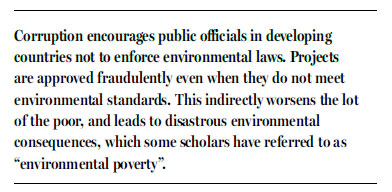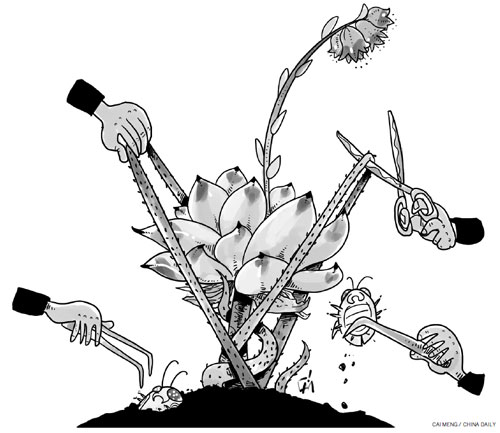Curb graft to boost growth, reduce poverty
Corruption is perhaps as old as human civilization. But with steadily growing population, accelerating economic activities, and intensification of global inequalities, it has become more commonplace and pervasive. Alan Greenspan, former chairman of the US Federal Reserve, has said: "Corruption, embezzlement and fraud are all characteristics that exist everywhere! It is regrettably the way human nature functions, whether we like it or not".
The magnitude and extent of global corruption is difficult to estimate because such activities are always covert and invariably done in secret. The World Bank estimates that bribery paid across the world every year exceeds $1 trillion. The World Economic Forum estimates corruption costs now exceed 5 percent of global GDP, a huge sum by any account.
Corruption seriously hinders poverty alleviation in developing countries in Asia. According to the Asian Development Bank, some 320 million people in Asia live in absolute poverty. Close to 30 percent of these poor are from South Asia and about 25 percent are from Southeast Asia. Poverty alleviation can at best be incremental when corruption eats into significant amounts of development funds. Asian countries like China, India, Bangladesh, Pakistan, Indonesia, Malaysia and the Philippines, which together account for half the world's population, all face pervasive corruption.
A World Bank analysis indicates that if developing countries can control corruption and the rule of law is properly enforced, per capita income could increase fourfold in the long term. On average, the business sector can grow by an added 3 percent per year, and socio-economic indicators like infant mortality rate could be reduced by some 75 percent.
More perniciously, several studies have shown that the costs of corruption are disproportionately borne by the poor. This means corruption not only deprives the poor of public goods but also increases income inequality.
Corruption encourages public officials in developing countries not to enforce environmental laws. Projects are approved fraudulently even when they do not meet environmental standards. This indirectly worsens the lot of the poor, and leads to disastrous environmental consequences, which some scholars have referred to as "environmental poverty".
In China, corruption and non-compliance of regulations have often been one of the main causes of rising pollution levels. Illegal discharges of hazardous industrial, mining and agrochemicals have rendered nearly 20 percent of China's non-arable farmlands unusable for growing food crops. In all developing countries in Asia, the quality of water in lakes, rivers and aquifers has deteriorated progressively because of corruption and non-compliance of laws. The long-term health and environmental costs of such corrupt practices are going to be very significant.
Corruption has become a way of life in most developing countries in Asia. Regrettably, it appears to be becoming more entrenched with time in many countries. A survey by Transparency International, in 2011, found that 66 percent of Bangladeshis and 54 percent of Indians had paid a bribe during the previous 12 months. In addition, 62 percent felt that corruption had worsened in their countries over the past three years.
In countries where corruption is rife, providing gifts, bribes and free services to public servants is often part of the local culture, because it is considered a way of showing gratitude and maintaining good relations with them. Honest civil servants often encounter intensive and sustained peer pressure if they want to shun or oppose corrupt practices.
Indeed, corruption can be controlled by strengthening institutions and upholding the rule of law.
Consider Singapore. It is an excellent example of how strong political will can ensure clean governance. In wide-ranging private discussions, Singapore's former prime minister Lee Kuan Yew said corruption had been commonplace in Singapore's colonial civil service. When his party came to power, its leadership enshrined anti-corruption as a development priority because it believed it was a prerequisite for good governance. The absence of corruption provided a hospitable and sustainable environment for foreign direct investment and economic development, two things the city-state needed most to reduce its high unemployment rate and expedite its economic development.
China is following in Singapore's footsteps. China's top leader Xi Jinping has declared a war against corruption, targeting both "tigers and flies" (high-ranking and lower-level officials). It has made considerable progress.
However, China is a vast country, with a population nearly 240 times that of Singapore. Because of its huge size, China's fight against corruption will take much longer time than in Singapore. Furthermore, to succeed, there must be a sustained interest at high political levels to control corruption. Many powerful Chinese politicians and bureaucrats are now behind bars because of their corrupt practices.
In contrast, in India, as eminent economist Jagdish Bhagwati has noted, the main problem is that no one gets punished for corruption, even in very serious cases. This has given many powerful politicians and senior bureaucrats a free license to steal.
As US President Barack Obama has noted, "a strong, more inclusive, more accountable and transparent" governance structure is needed which can strengthen national institutions and laws. This will reduce corruption and contribute to economic development and poverty alleviation in developing countries.
Asit K. Biswas is a distinguished visiting professor at Lee Kuan Yew School of Public Policy, National University of Singapore; Cecilia Tortajada is a senior research fellow at the Institute of Water Policy; and Augustin Boey is a research associate in the same school.



(China Daily 05/09/2016 page9)


















